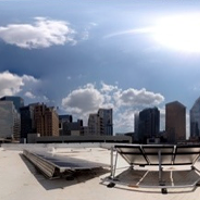Google Glass is all the rage on the interwebs lately. The nerds are a-flutter at the Internet-integrated glasses that make it incredibly awkward to have a human exchange with someone wearing them, so much so that a new term has come about for the glasses wearers: glasshole.
Unfortunately the pervy-est of nerds won't be able to extend the most intimate relationship they've had with their computers for years onto their newest tech; Google banned porn from the futuristic eyewear.
That's not all. Google, who has long been an anti-censoring proponent, has banned other functions of the admittedly cool gadget. Facial recognition has been nixed, as Forbes says, in a move that has pissed off developers.
I asked Kevin Davis, of Charlotte citizen photo and video licensing start-up Rawporter, if he sees any benefit for citizen journalists on the horizon with Glass.
Google Glass is expected to go on sale to the general public late this year, at the earliest.
Unfortunately the pervy-est of nerds won't be able to extend the most intimate relationship they've had with their computers for years onto their newest tech; Google banned porn from the futuristic eyewear.
The app that likely prompted the change is called Tits and Glass, which allowed users to watch sexually explicit photos and videos. The company behind the app, MiKandi, was very happy with the initial response, claiming that nearly 10,000 unique visitors visited TitsAndGlass.com in a day. MiKandi also said it was interested in going a step further; using Google Glass to facilitate "two-way adult interaction." Source: Mashable
That's not all. Google, who has long been an anti-censoring proponent, has banned other functions of the admittedly cool gadget. Facial recognition has been nixed, as Forbes says, in a move that has pissed off developers.
"[T]his announcement is not sitting well with app developers who voiced their frustration at missing out on a business opportunity by blaming the public for being concerned about privacy protection - considering such concerns anachronistic, anti-progress and even hypocritical."Source: Forbes
I asked Kevin Davis, of Charlotte citizen photo and video licensing start-up Rawporter, if he sees any benefit for citizen journalists on the horizon with Glass.
This is a tricky one because there are so many ways Glass can be used. I'm sure people are thinking this will be great for whistleblowers and to expose atrocities but will it? Glass isn't exactly subtle nor is it affordable (or available yet) for the masses. From a practical perspective it's great that you can shoot photos and record videos including audio for interviews using wearable tech. It frees up your hands so you can what, exactly?
I suppose if you're in crisis mode, or part of a catastrophe, then you can finally help others while covering a story but should you? Journalists are meant to cover events objectively but now expectations might change. I'd be curious to see what the usual journalism panelists have to say on this topic.
I think we have to be honest with expectations. It's unlikely that the audio is as good as you'd capture with a mic. The camera might be awesome but it can't possibly compare to HD video and images with zoom functionality - yet. We shouldn't ignore the obvious either ... We've seen the funny videos online where someone has to get within inches of the subject to really capture what's being said or seen. Is putting your actual face that close to story you're covering really that smart?
Google Glass is expected to go on sale to the general public late this year, at the earliest.
For more commentary, follow me on Twitter @dbirdy, for more photos peep my Flickr and to see all videos, subscribe to my YouTube channel here!
Teaser image on the homepage is a screenshot; credit: Mashable




